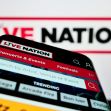Live Nation is pushing back against the Federal Trade Commission’s accusation that it profited from ticket scalping, while simultaneously pledging new reforms aimed at tightening oversight of Ticketmaster’s resale operations.
In a letter sent Oct. 17 to Senators Marsha Blackburn (R–Tenn.) and Ben Ray Luján (D–N.M.), Live Nation Executive Vice President Daniel M. Wall denied the FTC’s claims that the company collaborated with high-volume resellers to inflate ticket prices. At the same time, Wall said Ticketmaster will adopt a series of changes designed to curb abuses in the secondary market and address concerns raised by regulators.
Among the policy updates outlined in the letter, Ticketmaster plans to ban users, including ticket brokers, from operating multiple accounts across its system. The company will also begin requiring brokers to provide Social Security numbers or taxpayer identification when using Ticketmaster’s resale platform.
In what may be the most notable move, Wall said Ticketmaster will discontinue its TradeDesk platform, an inventory management tool that has drawn scrutiny for years from both lawmakers and consumer advocates. TradeDesk allows high-volume resellers to monitor and adjust ticket prices across multiple marketplaces in real time.
According to the FTC’s lawsuit, filed in September, Ticketmaster gave certain brokers access to TradeDesk despite their repeated violations of ticket-purchasing limits and anti-bot regulations. The agency alleged that by doing so, Ticketmaster provided “technological support” to scalpers who hoarded tickets and resold them at inflated prices, thereby allowing the company to profit from multiple layers of fees.
Wall forcefully rejected the notion that Ticketmaster conspired with brokers or knowingly enabled illegal resales. He said the FTC’s characterization of TradeDesk as a scalping tool was “plainly false,” describing it instead as a logistical product that helped brokers manage legitimate ticket inventories.
“That ticket brokers have been allowed to maintain multiple accounts is true,” Wall wrote, “but calling that conspiracy is specious.” He added that resellers operated in large numbers long before digital ticketing platforms existed.
Nonetheless, Wall said Live Nation would remove TradeDesk’s concert management functionality “to avoid reputational harm” and prevent further mischaracterization of its purpose. He also noted that similar software remains widely available through third-party companies such as StubHub and Vivid Seats.
The FTC’s complaint, separate from the Department of Justice’s ongoing antitrust action against Live Nation, accuses the company of violating the Better Online Ticket Sales (BOTS) Act and engaging in deceptive practices that harm both artists and consumers.
Regulators allege that Ticketmaster systematically allowed brokers to exceed artist-imposed ticket limits, obscured service fees until late in the checkout process, and facilitated the bulk purchase of tickets later resold at steep markups, sometimes on Ticketmaster’s own resale platforms.
According to the FTC, these practices enabled Live Nation to “triple dip” on profits: first through the original sale, again through resale fees, and a third time through service charges applied to each transaction.
Wall dismissed the complaint as “a distorted view of the facts and the law,” saying it relied on “novel and expansionist” interpretations of federal statutes. He insisted that Ticketmaster has long complied with the BOTS Act and continues to invest in technology to detect automated purchasing systems.
In the letter to lawmakers, Wall said Ticketmaster will now require each reseller to maintain a single verified account tied to a unique taxpayer ID. The company will also implement new technology to detect and remove duplicate accounts and conduct “post-on-sale ticket sweeps” to identify suspicious or fraudulent transactions.
“These measures will enhance transparency and strengthen the integrity of the marketplace,” Wall wrote.
Although Live Nation maintains that the FTC’s allegations are unfounded, the company’s decision to phase out TradeDesk and impose stricter verification protocols marks one of its most significant self-regulatory steps in years. The announcement comes amid mounting political pressure to reform ticketing practices following repeated consumer outcry over pricing, access, and transparency in the live events industry.






